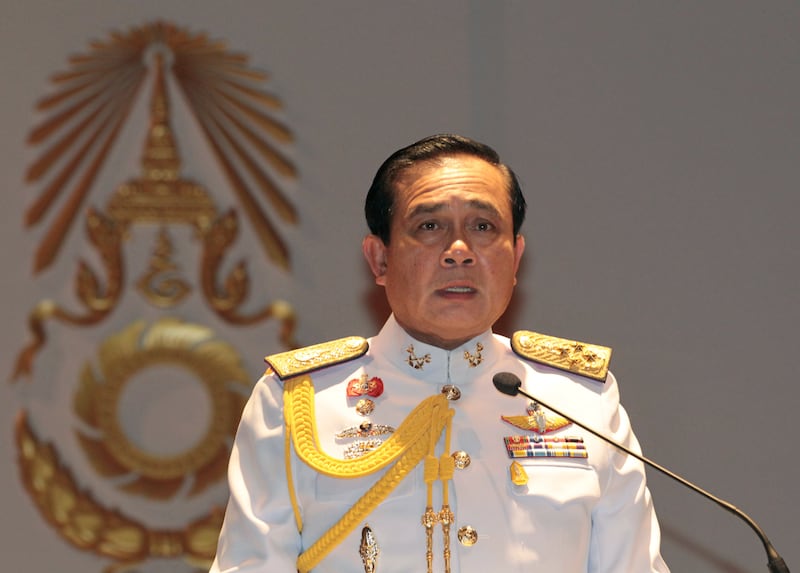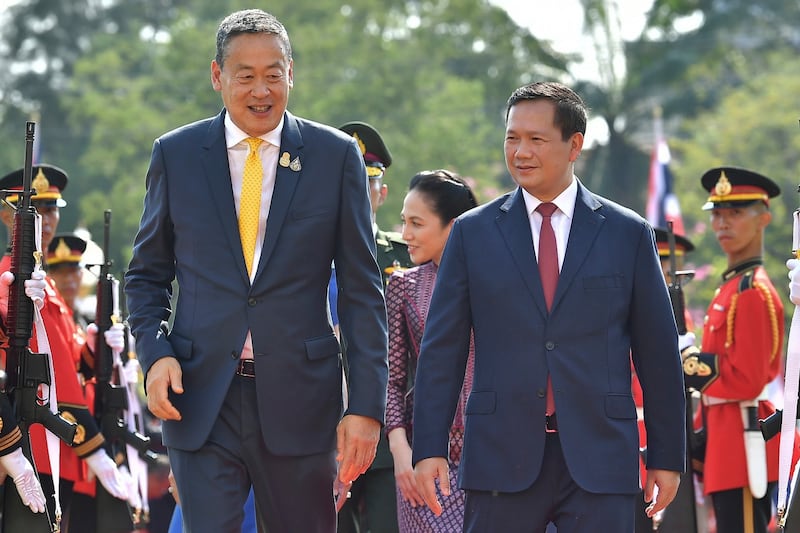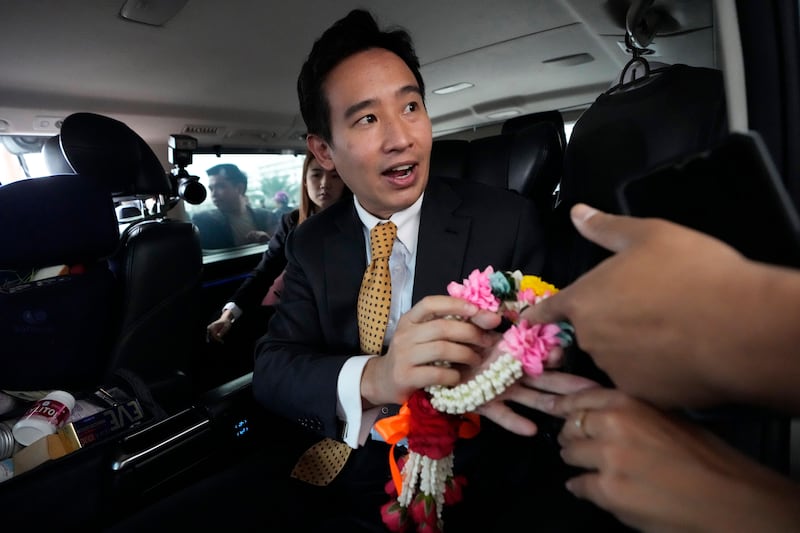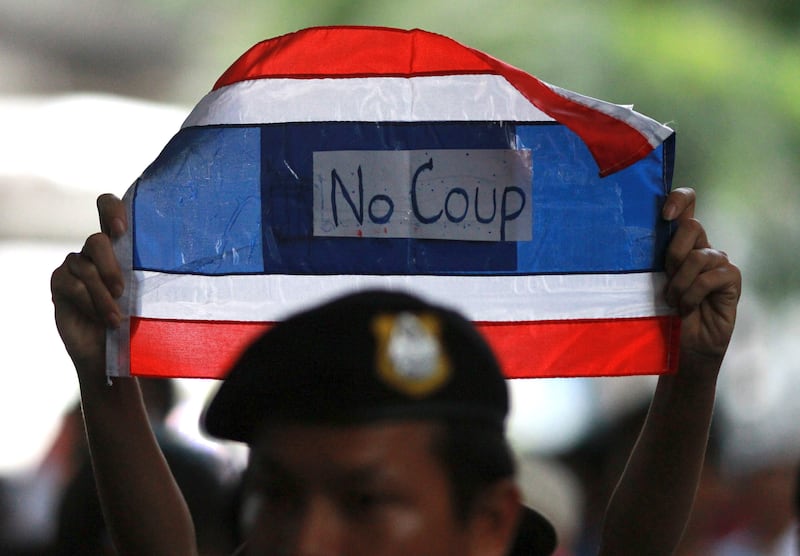A decade after the Royal Thai Armed Forces seized power in a military coup, democracy has technically been restored in Thailand, but the popular will continues to be thwarted.
Gen. Prayuth Chan-o-cha launched Thailand’s most recent coup on May 22, 2014, after it became clear that laws put in place following the previous military coup had not stopped the rise of populist parties.
During his nine years as junta chief and prime minister, Prayuth was in no rush to hand over power. An appointed Legislative Assembly governed for five years and a new charter, drafted in 2017, was designed to maintain military control of politics.
Now, the military continues to control politics, through four means.
First, royalist-military elites have weaponized Article 112 of the criminal code – lèse-majesté, the law against royal defamation – and other statues.
In the two decades before the 2006 coup, there was an average of five Article 112 cases per year. Between 2014 and 2017, there were an average of 105 cases per year. Since 2020, nearly 2,000 people have been charged under Article 112, the Emergency Decree, and other laws used to crush peaceful dissent.
Activists have sought to reform lèse-majesté in two primary ways.
The first is centered on de-linking Article 112 from national security provisions. If insulting the monarch is no longer viewed as treason, there will be shorter prison sentences for those convicted.
The second is to change the way Article 112 violations can be reported.
Currently anyone can file a report of lèse-majesté, and police have to investigate. Proposed reforms have called for the Royal Household Bureau to make the reports, potentially stopping abuse by serial accusers who use the law to target political opponents.

Attempts to reform Article 112 have been met with charges of trying to overthrow the government and monarchy. The government has found that charging people under Article 112, then releasing them under stringent bail conditions, is sufficient to neutralize them.
The second means has been a reliance on unelected bodies, including the Senate, Privy Council, Anti-Corruption Commission, and Election Commission.
The 2017 Constitution established a military-appointed Senate for a five-year term, which had the unusual power, for an upper house, to participate in electing the prime minister.
As such, a governing coalition required a supermajority of 376 seats, as the 250-member Senate, over half of whom were serving military and police, was expected to vote en bloc.
Although the opposition Pheu Thai won the most seats in the 2019 election (136), it was the military-backed Palang Pracharath that was allowed to form a government with only 116 seats because it had the full backing of the Senate.
Likewise, the Senate thwarted a government that reflected the popular will in 2023. Move Forward was never able to garner a super-majority, though its coalition easily controlled the lower house.

Although the appointed Senate’s term ended this month, a new 200-member chamber will be assembled, through an indirect process restricted to 20 different social and professional groups. But it will no longer elect the prime minister.
There is no unelected body in Thailand that has more power than the Privy Council. After his 2023 electoral drubbing, Prayuth was elevated to the Privy Council, where he continues to shape policy.
The Anti-Corruption Commission has made a mockery of itself by routinely exculpating military-backed politicians, while investigating opposition figures.
Although the Election Commission deserves credit for the management of elections and quick vote counts, before and after elections, its role has been highly politicized.
Prior to the vote, commissioners tinkered with voting districts and disqualified candidates. But their real power has been their ability to recommend the dissolution of entire parties, the third means of securing royalist-military control.
This began following the 2006 coup with the dissolution of the Thai Rak Thai party as well as its successor, the People’s Power Party. In 2019, at the recommendation of the Election Commission, the Constitutional Court disbanded the Thaksin-affiliated Thai Raksa Chart Party, after it nominated Princess Ubolratana, the elder sister of the King, as its prime minister candidate.
Following the 2019 election that saw the upstart Future Forward Party win 17.3% of the vote and 81 seats, its leader, Thanathorn Juangroongruangkit, and other executives were banned from political life for 10 years.
Future Forward quickly reconstituted itself as Move Forward, which then spent the next four years developing a nation-wide network, culminating in its electoral victory in 2023.

The Constitutional Court is currently deliberating on Move Forward’s dissolution, due to the party’s calls for reform of Article 112 during the campaign. Pita Limjaroenrat and 43 other executives face lifetime bans.
There is an obvious risk here: Disbanding Move Forward would not just be disenfranchising 38% of the electorate that voted for its candidates a year ago. Its popularity has grown since then to over 44% in one recent poll. There is always the potential for street demonstrations.
What has made the first three means possible has been military-royalist control over the judiciary.
Much of this leverage comes through the Privy Council. The president of the Constitutional Court and usually his predecessorserve on the King’s advisory panel, and through them control a vast patronage network.
Rather than the court being used to defend the constitutional monarchy, the judiciary has become a tool to defend an increasingly absolutist monarchy.

Under this system of royalist jurisprudence, the legal reasoning behind many of the Constitutional Court’s rulings, in general, and lèse-majesté cases, in particular, are legally and logically inconsistent.
At the time of the 2014 coup, Prayuth stated his intention that coups would no longer be necessary. Given the difficulty of amending the Constitution, control over the judiciary, weaponized laws, and the power of appointed bodies, “legal coups” are sufficient for the military to continue its hold on power.
Zachary Abuza is a professor at the National War College in Washington and an adjunct at Georgetown University. The views expressed here are his own and do not reflect the position of the U.S. Department of Defense, the National War College, Georgetown University or BenarNews.
